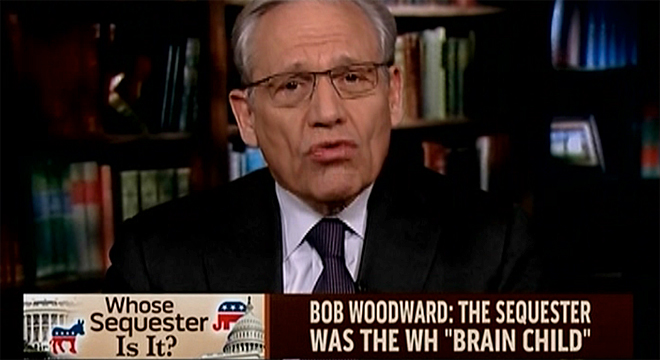This John Cassidy piece in The New Yorker is the best piece of analysis I’ve read of the Woodward debacle. He does Woodward the justice of honoring what he does as well as anyone else in Washington — which is get access to many of the people at the center of the most consequential historical events of our times. What’s less clear is what perspective or insight or analytical heft he brings to these narratives. Or as Cassidy put it more eloquently …
The real rap on Woodward isn’t that he makes things up. It’s that he takes what powerful people tell him at face value; that his accounts are shaped by who coöperates with him and who doesn’t; and that they lack context, critical awareness, and, ultimately, historic meaning.
Which still leaves us with the question of just how Woodward managed to stumble his way into this self-inflicted debacle since the entire thing was basically needless. As Cassidy notes, there were three stages to this fight. (If you want to see the pyrotechnic video version, check out David Taintor’s timeline here.) 1st was that the idea for the sequester originated in the Obama team. 2nd was the claim that Obama was ‘moving the goalposts’ by insisting on a sequester replacement that was a mix of tax hikes and budget cuts. And 3rd was the claim the Gene Sperling had threatened him in an email.
(Actually, scratch that. There was 2b — when he said it was madness for Obama to follow the law with the military spending part of the sequester. But let’s leave that aside and get back to our story.)
The first point seems to be true but is also basically a non-point. House Republicans were holding the country’s credit rating hostage and the sequester was an idea, a poison pill, to get out of that trap. Whoever’s idea it was, Congress passed it and the President signed it. So they’re both equally responsible. But as far as it goes, Woodward seems to be right on this point. In any case, no one disputes it.
On the second point, Woodward seems to be just as clearly wrong. And what’s so weird is that you don’t need to have Woodward’s access to know this. Normally, he’s got the secret interviews with Cantor and Lew and maybe Obama and probably everyone else. So he is the narrator, shall we say, reliable or not. And that’s always something he has over us non-Woodwardian mortals. But you really couldn’t be observingn the on-going budget standoff we’ve been in since early 2011 without realizing that this could never have been the agreement since they said at the time this wasn’t the agreement and the entire political debate since the summer of 2011 has been over a cuts-only and a ‘balanced’ (i.e., taxes and cuts) approach. (Brian Beutler explores the same points here.)
Helped by Cassidy’s review of Woodward’s modus operandi, it occurred to me: was even this goof a product of Woodward’s blindspot, thinking that insider interviews could trump what’s been spoken aloud for more than two years? It would be as though someone came forward now and said President Obama is actually a no new taxes man or is determined to expand our ground commitment in Iraq. It wouldn’t really matter what insider mysterious interview you had, we all know those things aren’t true.
In any case, Woodward went from accurate though non-germane claim to obviously inaccurate interpretation of the sequester deal to easily falsified and frankly ridiculous claim about getting roughed up by Gene Sperling.
Here’s Cassidy’s take …
For whatever reason–anger at the White House’s efforts to spin the sequester dispute; personal animus towards Obama; a genuine misinterpretation of what happened in 2011–Woodward threw an interception. Two, actually. If he’d stuck to pointing out that the sequester was a White House proposal, albeit one that was forced upon it by the G.O.P.’s willingness to force a debt default, he would have been fine; by accusing the President of doing a U-turn on revenues he went too far. And in accusing Sperling of threatening him, he greatly compounded his error and brought the world down upon himself.
For myself, I’m not really quite sure why Woodward stumbled into this other than some sort of personal animus toward the President and the White House that crept into his thinking and clouded his judgment. It’s not like he’s never been criticized before certainly. But perhaps there’s something about how long he’s been at the top of the pecking order, something about the character of the current Washington establishment that he typifies that made him more brittle and reckless than before. Everybody’s saying now that surely Bob Woodward has gotten harder pushback, more bullying than this. But really? How recently? I think he’s been much more coddled in recent years than people are inclined to admit. Only someone seriously off his game, someone who thinks no one’s going to call him on transparent BS muffs it like this.








